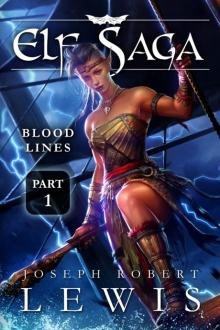- Home
- Joseph Robert Lewis
Ultraviolet
Ultraviolet Read online
Ultraviolet
by
Joseph Robert Lewis
Special thanks to Todd and Todd
Copper Crow Books
Copyright © 2014 Joseph Robert Lewis
Cover by Joseph Robert Lewis
Edition: February 2014
This is a work of fiction. Names, characters, places, and incidents either are products of the author’s imagination or are used fictitiously. Any resemblance to actual events, locales, or persons, living or dead, is entirely coincidental.
All rights reserved. No part of this publication can be reproduced or transmitted in any form or by any means without permission in writing from Joseph Robert Lewis.
Chapter 1
Prototype
It’s easy to remember the day when my whole life changed because that’s the day people started shooting at me. And since I had just finished college and spent eight months in my first (and last) desk job as a junior engineer, the whole shooting business was pretty memorable.
You see, I had promised my parents that when my project at work was finished, I’d get a big promotion. I promised I would use the bump in my salary to get them out of the south side. I promised that everything would be better soon. I promised a lot of things.
And then I got fired.
“Listen, Carmen, I’m sorry, but we’re going to have to let you go.”
That’s how Brian said it. He was nice enough, but he was always exhausted and buried under a hundred problems, so he really didn’t have much time or energy for being very warm and friendly. His life seemed pretty miserable, so I didn’t blame him. Much.
“Oh.”
That’s how I reacted. I wasn’t even that surprised. I knew it might happen. In fact, since my project was going nowhere, I was pretty sure it was about to happen. But still, when it did happen, I couldn’t think of anything to say. Usually I’m pretty quick with a comeback, but instead I just nodded and started clearing out my desk. Stunned. I guess I wasn’t really prepared to have my whole life plan just fall apart like that.
You see, I was one of the lucky ones. My dad had saved enough money from the early days, back when he was an accountant and not a junk miner, and he’d been able to send me to college right out of high school, full ride, basically. So there I was, fifteen years old and spending six of the best months of my life getting my bachelor’s.
Yeah, I know. In the old days you had to stay in school until you were eighteen, and then it took four years to get a degree, but the megacorps figured that was a pretty poor use of time and resources, letting teenagers sit around in classrooms for all those years when they could be working. So the laws changed. Apparently, there was a lot of that going on back then.
There were only fifty or so kids in my class, so when I graduated I didn’t have much competition for jobs. Then again, I didn’t have much choice in jobs either. This was about fifteen years into the Depression, so there were only about three companies that could afford to hire someone like me. I suppose it was lucky that Cygnus Systems had a few offices in Baltimore, so I didn’t have to move away from my parents.
There’s that word again. Lucky.
But I was lucky. After all, everything is made by Cygnus. Well, that’s not quite true. Cygnus only makes one thing. Printers. Three-dimensional printers. Personal manufacturing, right in the comfort of your own home. Whatever you want, you just download the schematic online and make sure you’ve got enough feedstock in the printer, and hit Print. Blue jeans, baby dolls, spatulas, cell phones, posters, glasses, Christmas decorations, vibrators, lawn ornaments, light bulbs, nose hair trimmers, whatever you want, you can make it right there in your living room with the push of a button.
They say it took years for 3D printers to catch on, but once they did, it didn’t take long for the whole country to fall apart. No more manufacturing companies, no more warehousing, no more shipping. And aside from the people who actually made things, every one of those old companies had its own accountants, secretaries, marketers, IT staff, and guys who fetch donuts, but when a company folds, everyone’s out of a job.
Big businesses, little businesses, mass produced, hand crafted, all gone. Poof. Thirty percent unemployment in less than two years. The housing market fell, and kept falling, so everyone left the suburbs to find places in the city where there was work. If you can call it work.
A handful of industries stayed intact. Food, medicine, power. People still get hungry, and they still get sick. Although sometimes it’s hard to tell the difference between the food and the meds. The computer guys thought they were safe, but once some hacker in France released the programming language so that anyone could design printer specs for new products, designer jobs got really cheap, really quick.
Even with Cygnus cracking down on illegal torrents and file sharing, there was no stopping it, and frankly, they didn’t try very hard. Why bother? The more products people could make, the more feedstock they would use up. And that’s where the real money was. Not in selling the printers, and not even in licensing out the product spec downloads. It was the feedstock.
Little cylinders of plastic, different types of glass, rubber, and some organic compounds. But mostly metal. Bars of nickel, tin, zinc, iron, copper, and even silver, gold, and platinum. That’s what you still needed to buy, because the printers couldn’t recycle old things into new things.
And that’s where the new industries sprang up. Garbage reclamation. Urban mining. Recycling. Sooner or later, all of the people who got laid off during the Big Crash ended up working in a mine or a landfill. Artists, middle managers, data entry, customer service, accounting. If you’ve got hands, you can sort trash.
Some folks managed to get out. There was still demand for designers for triple-A games and movies and other media. Or you could always go out west and work on a farm. And my mom had a government job, social services, getting paid squat-and-a-half to take care of all the abandoned kids in the city. But in Baltimore, when you ran out of options for work, you went to the South Side Reclamation Facility. Like my dad.
Ten hours a day, digging through decades’ worth of rotting, rusting garbage to haul by the ton to the recycling plants to make new feedstock to sell back to the impoverished masses, sitting at home, watching their precious 3D printers spit out new high-tech toys and designer clothes, so they could pretend to be rich and happy for a few hours before they went back to work in the mines and smelting plants.
So when I scored the job at Cygnus, I thought I was out, I thought I was safe. Nothing but air conditioning and free coffee for me, eight hours sitting on my ass in front of a really big screen, doing what I loved. Science. Actual science. Physics and optics. Playing with light, photons and waves, creating illusions, tinkering with energy phase states. According my friends, this is all really boring crap, but to me, it was paradise.
They put me on a new team in the Research division, which is a bunch of guys who are always trying to beat the Finns and the Japanese to the next big breakthrough in 3D printing, or personal manufacturing, or whatever the PR department was calling it that week.
I started saving up for a condo. I thought about getting a dog. Or maybe a lizard.
They put me on a solo project, very low priority, mostly research and no development. Apparently, holographic tech had already been explored by smarter people than me and no one expected it to produce anything marketable, but the marketing people still wanted to be able to say that we were “pioneering” the field of holography, so there I was. All alone in my little office-slash-lab on the seventh floor of Building C on the Cygnus West campus, pioneering away. And it was fantastic. Huge computers, laser arrays, virtual reality gear. Who wouldn’t love playing with those toys every day?
The thing was, I re
ally thought I could do it. I thought I could actually come up with something good, something big. I loved optics. Solid waveforms, cold photons, new states of matter, building the Holy Grail bridge between quantum mechanics and general relativity… I was in heaven. I really was, for eight whole months. Eight whole months of sitting in my little office, surfing the web, building wireframe models, eating free food at monthly status meetings, running simulations, going to office parties. I even dated a co-worker. Martin Something-or-other. Pretty great, right?
And then I found some research papers from a team in South Korea and that led me to some experimental results from a university in Australia, and I was really convinced that in another week, or two, or three, I might actually invent something new. A holographic TV system, probably. I mean, just think of the games and movies, not just looking 3D but actually being 3D! The military contracts alone would be worth a fortune. And me? I’d be rich, set for life, and I’d be able to get my parents out of that horrible row house downtown, and…
I got fired. I think I mentioned that already.
It was the Finns. Stupid blonde giants. They cracked the holographic TV first, locked up about two hundred patents on the hardware and software, and instantly everyone started downloading the specs so they could print out their own holographic TVs. The actuaries at Cygnus did the math and figured that by the time we entered the market, it would already be saturated with Finnish designs, and then super-saturated with black-market illegal downloads, so there was no point in continuing the project. It was canned. And so was I.
So that day sucked.
The good news was that in the eight months I was at Cygnus, I had saved up enough money to live on for about three months without getting a new job. So I went home to my miserable, tiny, leaky-ceiling apartment on the west side, and I kept working on the holo system. Not on the TV version. That ship had sailed. But there was still the government. The government still had jobs, and contracts, and of course, the military. It was a long shot, but at the time, it seemed like my only shot left. I was still hopeful. I still thought I could get me and my family out.
I had promises to keep. And I wanted that lizard.
Two months later, I had it. At least, I thought I had it. A complete system design, a new version of holographics that I was sure someone at the Department of Defense would want. I had a machine that could turn light into physical objects. Solid state photonic field generator, hard light projector, tactile holography, cold photon manipulator… whatever the sales folks would call it, I had it, and all of the math and materials analysis were perfect. Just turn it on and it would create real, physical objects out of simple beams of light. It would work.
It would.
The next step was to test it, but the only way to build a prototype was using my own home printer, and that meant I needed feedstock. And I needed something rare. Rubidium.
Rubidium is just another weird metal that most people don’t ever hear about or use. In fact, it’s not very useful. It melts at only 103 degrees F, and it can explode if it touches water, so yeah, not very useful for most people.
But I guess I’m not most people.
When I checked the current feedstock prices that day, my heart almost stopped. Rubidium wasn’t just expensive or rare, it was only available on special order, which meant extra government inspections, which meant extra delays and extra fees. I did the math. The bill would wipe out my savings.
I did it anyway.
It cost me everything. Literally everything in my savings, and my tiny retirement fund. I even took a few loads of clothes and dishes and my TV down to the local recycling center for a few extra dollars. I had nothing left, even for food. I wasn’t too worried about food, to be honest. I had a lot of packets of noodles lying around. I mean, a lot.
So I waited. It took six days to get my order, six days of sitting in a silent apartment with no clothes to change into and nothing to eat but noodles. Plain noodles. No meat, no veg, no sauce. For six days. I barely answered my phone, only sent my parents short text messages, and basically stared at my holo specs.
I didn’t want anyone to know what I was doing. Didn’t want any questions, didn’t want to look pathetic, didn’t want to have anyone point out that I was going to fail. I should have been out looking for a new job, but instead I was gambling my whole future on this one idea, and I knew it was stupid and risky.
I just didn’t need anyone else telling me it was stupid and risky.
But I didn’t waste the time. I spent day after day programming the firmware for my new holo projector. I named the system Lux, because why not? And then I started filling up the built-in memory with the designs of objects for the projector to render. I started with simple tools like hammers and screwdrivers, and then just about every utensil in my kitchen. I figured if I ever needed to sell more of my stuff to the recycling center for cash, I could always just make holographic replacements.
Then I got bored so I imported the designs for most of my paladin character’s armor and weapons from Gyroware’s Demon Age 3, and I tried to import a Ferrari’s specs from Global’s Gran Prix Americana 4, but the car was just too big. Oh well.
And then the box finally arrived.
It was all there, all the feedstock I had ordered and dumped my life savings into, so I went to work, carefully inserting all of the cylinders into the printer. The metals, the plastics, the rubbers, some as thin as a pencil and some as thick as my arm. Then I loaded the new prototype specs from my phone and pressed Print. It said it would take two hours, so I lay down on the floor beside the printer and went to sleep with the smell of melting plastic burning my nostrils.
Bang, bang, bang.
I sat up so fast it made me dizzy, and I frowned at the printer, and then at the door of my apartment. Time had passed, but I had no idea how much. The printer wasn’t making any noise.
Bang, bang, bang.
“Miss Zhao? This is Special Detective Gabriel Frost with the Baltimore City police. Please open the door.”
I stared at the door.
Special Detective?
There was nothing special about them, they were private security on permanent loan from Cygnus Systems to the local precincts and I didn’t need to be an ex-Cygnus employee to know that when a Special Detective comes looking for you, you don’t let them find you. They made people disappear. At least, that’s what I’d heard.
I leapt to my feet and grabbed my jacket and my shoes. My heart was racing and my palms were sweating and I had no idea what I should be doing except that I wanted to be out of there. I knew why they were there, of course. I’d done everything I wasn’t supposed to do. Continuing research into proprietary technologies for private profit, loading non-Cygnus specs into my printer, and who knew what other charges they would throw at me.
Stupid rubidium. There must have been security flags on that too. Idiot!
I froze.
The printer!
I dashed across the living room and grabbed the neatly arrayed pile of black, webbed fabric from inside the printer, and then I dashed back through the apartment to my bedroom just as I heard the electronic override on my front door chime and the door swung open on its squealing hinge. The floor thumped and creaked as someone came inside. Or maybe two or three someones.
I shoved the window up, which betrayed me with a horrible wooden shriek, although it didn’t open all the way, so I had to slither out the narrow gap on my belly and just tumble out onto the rusty fire escape face-first.
“Stop! Freeze!” a man shouted.
I scrambled to my feet and lunged toward the steps, and at that moment I both saw and remembered that the fire escape only went down to the third floor because everything below that had been torn off when a garbage truck malfunctioned and hit the building a year and a half ago. So I froze for a second, because apparently that’s what I do in a crisis, just freeze up and stare at an obvious problem. And then I spun around and started going up the stairs to the roof.
&n
bsp; I’ll admit, before that hot, muggy afternoon when Special Detective Frost knocked on my door, I hadn’t had to deal with many stressful situations. Not up close and personal. No siblings to fight with, no overbearing parents to rebel against, no bullies at school, no sexual harassment at work. Whenever I admit these things to my friends, they all say the same thing.
I’m lucky.
They think I’m lucky.
I think that’s sad, and terrifying.
But that afternoon, it felt like the universe was making up for all my good luck all at once. I reached the roof with my legs and lungs on fire, and there I was treated to a view of ancient chimneys, exhausts, fans, antennas, satellite dishes, bird nests, and bird shit. Lots of things, none of which could help me.
The fire escape behind me clanged and jangled as Frost hurried up the old metal steps. I could hear him grunting. I glanced down and saw the top of his head, just a smudge of black hair through the metal grating of the landings.
I ran.
I bolted along the side of the building, looking over the edge for something, anything. I’d only seen about a million movies and games where people escaped from the roofs of buildings just like this. There was always a clothes line or a power cable or some precariously leaning pole of some sort, or maybe just a small gap between the buildings so the hero could jump to the next building. But there were no cables or poles, and the neighboring buildings were all taller than mine. So there was nowhere to go.
I ran to the little shed-looking thing where I figured I would find the stairs leading back inside, and grabbed the handle.
Locked.
Naturally.
“Carmen Reyes Zhao!”
I spun around. A man in a black suit was stepping off the fire escape and onto the gravel roof. He strode toward me with this dull, grim look on his face, like he chased people onto roofs every day and this was just one more lousy day at the office. And for him it probably was.

 Daphne and the Silver Ash: A Fairy Tale
Daphne and the Silver Ash: A Fairy Tale_preview.jpg) Wreck of the Frost Finch (Aetherium, Book 0 of 7)
Wreck of the Frost Finch (Aetherium, Book 0 of 7) Chimera The Complete Duet
Chimera The Complete Duet Elf Saga: Bloodlines (Part 1: Curse of the Jaguar)
Elf Saga: Bloodlines (Part 1: Curse of the Jaguar) Freya the Huntress (Europa #2: A Dark Fantasy)
Freya the Huntress (Europa #2: A Dark Fantasy) Chimera esd-7
Chimera esd-7 Halcyon est-1
Halcyon est-1 Europa
Europa The Dragon and the Lotus (Chimera #1)
The Dragon and the Lotus (Chimera #1) Halcyon (The Complete Trilogy)
Halcyon (The Complete Trilogy) Ultraviolet
Ultraviolet Wren the Fox Witch es-6
Wren the Fox Witch es-6 Wren the Fox Witch (Europa #3: A Dark Fantasy)
Wren the Fox Witch (Europa #3: A Dark Fantasy) Omar the Immortal es-4
Omar the Immortal es-4 Aetherium (Omnibus Edition)
Aetherium (Omnibus Edition) Freya the Huntress es-5
Freya the Huntress es-5